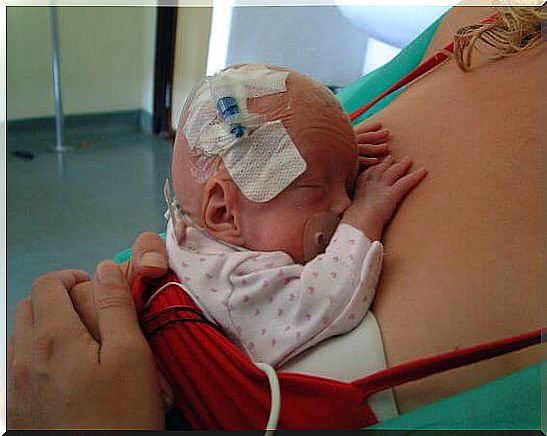What Are The Implications Of Low Birth Weight?

Low birth weight is a fairly common feature in children around the world. Various investigations consider the causes of this problem and try to determine the main consequences. It is a fact especially related to infant mortality. It is also known that one of the causes of this condition is premature birth.
A baby that is considered underweight is one that is born weighing less than 2,500 grams. In some cases it is due to being born prematurely, commonly called premature babies. While other cases could be due to a delay in growth in the womb due to inadequate nutrition or other prenatal problems.
Possible causes of low birth weight
Low birth weight is a consequence of internal and external factors. Likewise, it is determined by factors that were considered risky from pregnancy. Although most of the causes have to do with the mother’s care during pregnancy, sometimes it is due to congenital problems.
Among the risk factors for low birth weight, these main causes have been determined:
- Maternal causes. Malnutrition, anemia, drug addiction, alcoholism, smoking, high blood pressure.
- Problems in pregnancy. Detachment of the placenta, the fetus receives little oxygen, insufficient blood flow, infections.
- Inadequate care. Inappropriate diet, lack of prenatal care, stress.
- Natural causes. Mothers under 17 and over 35 years old.
Consequences of low weight in the newborn

The underweight baby can have complications; the lower the weight, the greater the risks. First of all, his body is not as strong as the normal-weight child. You may have problems with eating and breathing. In addition, since he does not have a lot of fat in his body, maintaining a temperature in his body is difficult.
Among the main implications of low birth weight we have the following.
Respiratory problems
It is very common in babies born before week 34. Respiratory distress syndrome, as its name implies, is a respiratory disease caused by insufficient lung development. This is because the baby does not have a protein called “surfactant,” which prevents the air sacs in the lungs from collapsing. They may need oxygen and other breathing treatments for the lungs to work.
Pneumological problems
The problem of bleeding in the brain is the main risk at the pneumological level. It can affect underweight babies during the first 3 days after birth. Most bleeding is minor. However, when it is very serious it can put pressure on the neonate’s brain, causing an accumulation of fluid that results in brain damage.
Gastrointestinal disorders
In this case, a serious intestinal disease that is common in premature babies, necrotizing enterocolitis, is indicated. This can be very dangerous as it is capable of causing inflammation in the tummy.
Inability to maintain body temperature

As discussed earlier, low-birth-weight babies do not have enough fat in their body to maintain an adequate temperature. This can cause chemical changes in the blood and slow growth.
Retinopathy of prematurity
A problem that affects the blood vessels of the eye. Most cases can be cured with little or no loss of sight. However, a treatment must be maintained so as not to lose it completely. This occurs in babies born before the 32nd week.
- Hepatic immaturity. It is the immaturity of the liver, it can have complications because it does not work properly.
- Immaturity of the immune system. The baby is at risk of infection, and therefore complications can increase.
Syndrome of sudden infant death
Most low birth weight infants require specialized care in the neonatal intensive care unit. This problem can be serious, so a way must be found for the baby to gain weight.









